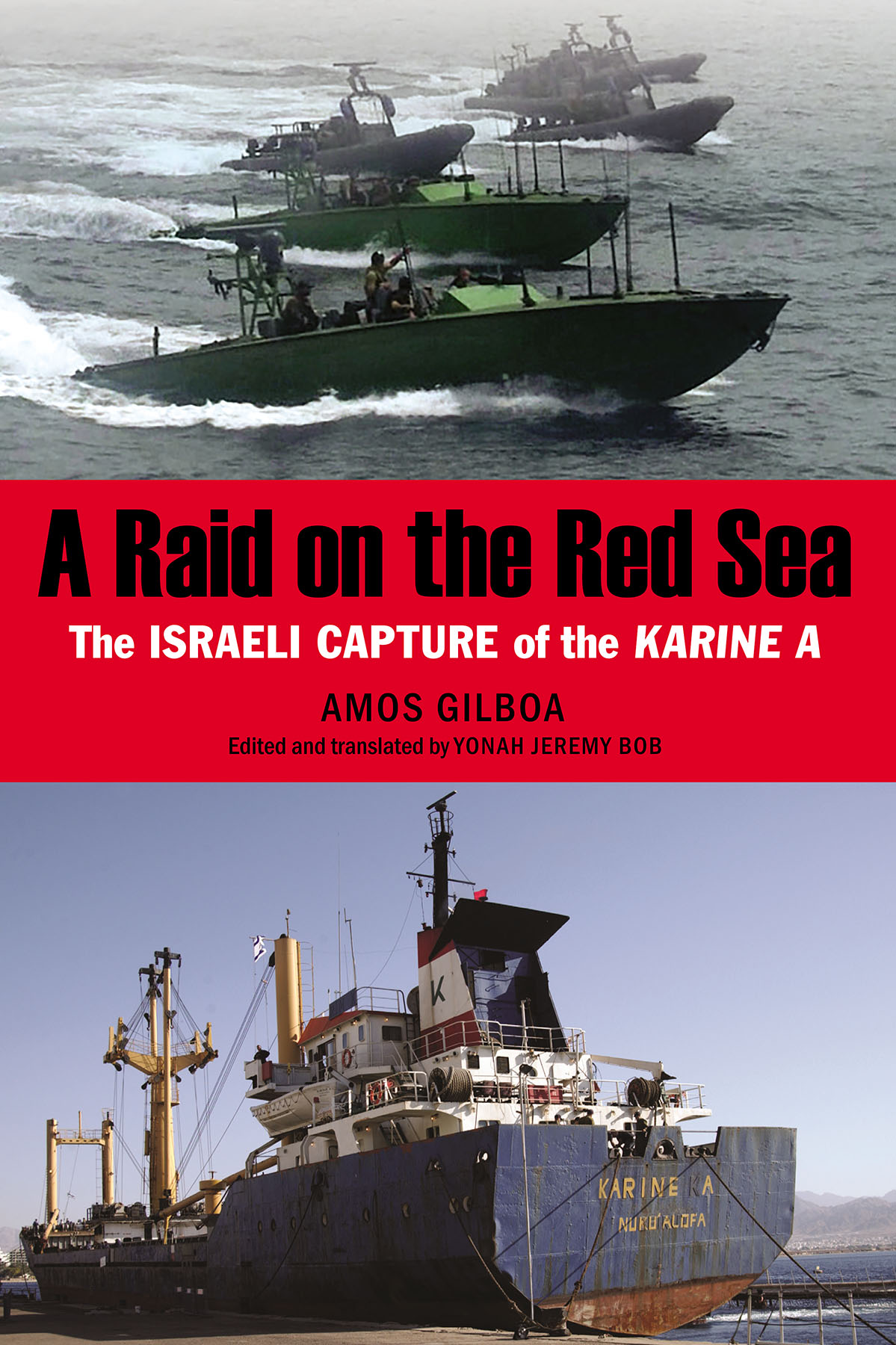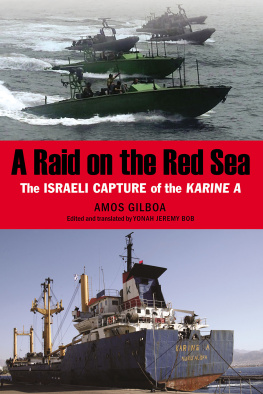
This is the riveting and untold story of the behind-the-scenes intelligence and operational heroes who overcame tremendous obstacles to capture a massive weapons smuggling ship, which permanently and fundamentally altered U.S. policy in the region regarding the Palestinians and Iran.
Lt. Gen. Shaul Mofaz (Res.), former Israeli defense minister and Israeli Defense Forces chief of staff
For Rumsfeld, Cheney, and Bush, the Karine A affair obliterated the vestiges of Arafats reputation as a peacemaker. It was a decisive event in the history of U.S.Middle East policy. It shifted the balance of bureaucratic power away from those intent on wooing Arafat to those determined to shun him. The ships capture is a story as thrilling as an episode of Fauda. General Gilboa gives a lively accountexciting, incisive, and historically valuable.
Douglas J. Feith, former undersecretary of defense for policy and senior fellow at the Hudson Institute
In the publics imagination, usually the Israeli Air Force is the tip of the sword protecting the Jewish state. This time it was naval intelligence and commandos who saved the country from a hail of fiery missiles that would have spelled catastrophe in the days before meaningful missile defense.
Adm. Yedidya Yaari (Res.), former chief of Israeli Defense Forces Navy
The Karine A story exposed the cooperation between Yasir Arafat, Iran, and Hezbollah in their attempt to kill thousands of Israelis. The book depicts this and Israeli intelligences efforts, backed by its American counterpart, in a captivating fashionfrom the first scent picked up by intelligence that there was trouble until the final diplomatic results.
Brig. Gen. Yossi Kuperwasser (Res.), former head of the Analysis and Production Division of Israeli Defense Forces Intelligence
A Raid on the Red Sea
The Israeli Capture of the Karine A
Amos Gilboa
Edited and translated by Yonah Jeremy Bob
Potomac Books
An imprint of the University of Nebraska Press
2021 by Amos Gilboa
Cover designed by University of Nebraska Press; cover images courtesy Israeli Defense Forces.
Adapted from Dramah ba-Yam ha-Adom: Tefisat arin A, oniyat ha-neshe ha-Palesinit, 3 be-Yanuar 2002 (Israel Intelligence Heritage and Commemoration Center and Effi Melzer, Inc., 2017).
All rights reserved. Potomac Books is an imprint of the University of Nebraska Press.
Library of Congress Cataloging-in-Publication Data
Names: Gilboa, Amos, author. | Bob, Yonah Jeremy, editor, translator.
Title: A raid on the Red Sea: the Israeli capture of the Karine A / Amos Gilboa; edited and translated by Yonah Jeremy Bob.
Other titles: Dramah ba-Yam ha-Adom. English
Description: Lincoln: Potomac Books, an imprint of the University of Nebraska Press, 2021.
Identifiers: LCCN 2020025424
ISBN 9781640123571 (hardback)
ISBN 9781640124424 (epub)
ISBN 9781640124431 (mobi)
ISBN 9781640124448 (pdf)
Subjects: LCSH : Karine A (Ship) | Israel. el ha-yam. Shayeet 13. | BlockadeGaza Strip. | Illegal arms transfersIran. | Military intelligenceIsrael. | IsraelHistory, Naval21st century.
Classification: LCC DS 110. G 3 G 5313 2021 | DDC 956.9405/5dc23
LC record available at https://lccn.loc.gov/2020025424
The publisher does not have any control over and does not assume any responsibility for author or third-party websites or their content.
Contents
At 0400 hours on January 3, 2002, the Israeli Navy Seals (Shayetet 13) clandestinely seized a Palestinian Authority freighter named the Karine A in the Red Sea at a distance of several hundred nautical miles from Israel. The ship was carrying fifty-five tons of high-grade Iranian weapons, including rockets that could destroy large Israeli cities, from the Islamic Revolutionary Guard Corps for the Palestinian Authority. The weapons, loaded onto the ship near the coast of Iran in the Persian Gulf, were headed for the Gaza Strip to help fulfill a joint goal of Iran, Hezbollah, and the Palestinian Authority of seriously escalating a campaign of terrorism (referred to as the Second Intifada) against Israel.
This operation marked the first time that Israel captured a large Palestinian cargo ship smuggling weapons. It was also the first time in history that any military force captured a moving ship with synchronized forces that both climbed onto the ship clandestinely from the sea and slid from helicopters down special fast ropes to the deck.
This thriller reveals the until-now classified intelligence, military operations, and diplomacy angles of the story. Israels successful operation continues to shape sea-based conflicts over weapons smuggling between Israel, Iran, Hezbollah, and the Palestinians to this day. Generally, Israel is pitted against Iranian attempts to smuggle more advanced weapons to Hezbollah and Hamas for their use against the Jewish state.
A Raid on the Red Sea tells the story of how Israeli intelligence discovered the Palestinians had bought a ship to smuggle Iranian weapons as well as how it identified, located, and tracked the ship. The book also gives an exclusive, detailed description of the close working relationship between Israeli and U.S. intelligence in locating and tracking the ship at critical moments. This included the time when Israeli intelligence was concerned that it had lost the ship, meaning that months of effort had potentially gone down the drain. It gives an insiders view of how the daring capture operation was planned and how the Israeli Navy Seals had to make last-minute improvisations as they faced a torrential storm.
Brig. Gen. Amos Gilboa (Ret.) is the ultimate insider to tell the story, having served as the number 2 in Israel Defense Forces Intelligence ( IDI ) from 1982 to 1984 and having worked in other intelligence capacities for decades. In Israel, the Israel Defense Forces ( IDF ) Intelligence Directorate is by far the most powerful of the intelligence services. As such, his experience gives Gilboa far more influence and insight than even the deputy director of the U.S. Central Intelligence Agency or the Defense Intelligence Agency. Most critical to the story, Gilboa knows the key characters extremely well, including Hezbollah military chief Imad Mughniyeh, who was the likely mastermind of the Karine A weapons-smuggling plot. In 1984 Gilboa had briefed U.S. senator Daniel Inouye ( D - HI ) during a crucial and off-the-books visit, confirming and revealing aspects of Mughniyehs involvement in planning the terrorist attack that had killed 241 U.S. Marines in Beirut, Lebanon, in 1983. At the time Inouye confided to Gilboa that the United States was still trying to understand what had occurred before forging its future Middle East policy. Gilboas peerless knowledge of Mughniyeh was likely among the reasons that Israeli intelligence chose him to perform the classified operational review of the Karine A saga, which Gilboa is only revealing now.
This book also tells the diplomatic side of the story and its far-reaching consequences of the George W. Bush administrations calling for Yasir Arafat to be replaced as leader of the Palestinian Authority. This was part of a turning point in the U.S. administrations political strategy regarding the Israeli-Palestinian conflict and its grasping of Irans broader role in promoting terrorism and instability in the Middle East. Irans significance was highlighted in an August 2002 speech by U.S. undersecretary of state for arms control and international security John Bolton, who went on to serve in 201819 as the national security adviser to President Donald Trump, heavily shaping the countrys Iran policy.
Next page







